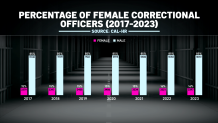In a lengthy legal battle, hundreds of female prison guards in California are fighting for their rights against the California Department of Corrections and Rehabilitation (CDCR). Their contention? The denial of reasonable accommodations or lighter duties during pregnancy without facing demotions or pay cuts.
Lia McKeown has worked for 16 years at the California Medical Facility in Vacaville, a medium security male prison for elderly and chronically ill inmates. As a correctional officer at the prison, McKeown says despite enduring punches, kicks, and even having feces thrown at her as part of her job, she never expected such treatment while pregnant.
It was during McKeown’s second pregnancy she says she was informed of a policy change.
“There was no accommodation, there was no putting you anywhere." said McKeown. “You would have to kind of basically figure out a way to go hide yourself."
Get top local stories in San Diego delivered to you every morning. Sign up for NBC San Diego's News Headlines newsletter.
There was no accommodation, there was no putting you anywhere. You would have to kind of basically figure out a way to go hide yourself.
Lia McKeown, Correctional Officer at CMF
In 2015, McKeown’s employer, the California Department of Corrections and Rehabilitation replaced a pregnancy accommodation policy that allowed pregnant staff to take on lighter duties during pregnancy.
McKeown says she continued working 16-hour shifts, while carrying a 15-pound work belt around her waist. To minimize contact with inmates she moved to first watch, also known as the prison’s night shift.
But in 2018, when McKeown, who had decided to continue growing her family, was pregnant again she says she was asked to perform an emergency cell entry and search an inmate’s cell. When she moved a heavy locker, a place where inmates commonly hide drugs, she says she felt a sharp pain.
“I thought I just kind of tweaked my back. But it ended up, I ended up miscarrying,” said McKeown.

McKeown and nearly 300 other women are now plaintiffs in a class action lawsuit against CDCR alleging discrimination, retaliation, and the denial of pregnancy disability rights. Multiple correctional officers claim they suffered miscarriages and lost wages due to the abrupt change in the policy.
Melissa Glaude, another plaintiff in the lawsuit, recounts being asked to perform an emergency cell entry while 24 weeks pregnant. Refusing the risky task, she says she was forced onto disability leave, receiving only half of her pay.
“I mean, I got to bring my babies home, but not everybody did," said Glaude.
I mean, I got to bring my babies home, but not everybody did.
Melissa Glaude, Correctional Officer at CMF

Attorney Arnold Peter is representing the women. He argues CDCR violated state law, emphasizing that other prison systems and law enforcement agencies provide accommodations for pregnant officers.
According to the lawsuit, under CDCR’s new policy pregnant staff had three choices:
- Stay in their current position, waive any medical restrictions, confirm their ability to perform each and every essential job function and assume liability for any injury caused by their decision to ignore medical restrictions;
- Accept a demotion, resulting in reduced pay, loss of peace officer status, loss of seniority, loss of benefits and loss of right to bid for shifts.
- Or take a combination of paid and unpaid leave as an accommodation.
According to Cal-HR data, since 2017 between 15 to 16 percent of CDCR’s correctional officers have been women. CDCR’s website shows the first female correctional officers were hired in the 1970’s and they claim to currently hire women at a higher rate than the national average.

The California Civil Rights Department, a state agency charged with protecting workers from discrimination, has also brought a separate lawsuit against CDCR for the same 2015 policy.
Facing lawsuits and a bill to address the issue, in 2020 CDCR reverted to its pre-2015 policy. But plaintiffs like McKeown say the damage has been done. She adds that she also suffered a work-related back injury during her fourth pregnancy. An inmate physically attacked her and another officer during an emergency cell entry. That injury left her unable to work for three years.
While CDCR declined our request for an interview, they indicated that a settlement to the class-action lawsuit is underway.
“Negotiation has led to an expected resolution to the two class action cases, pending court approval. The proposed settlement will provide significant benefits to members of the settlement class, and acknowledges that the underlying, disputed policies have ended. We are pleased to have reached this point, because the proposed settlement will provide a fair resolution for all parties. We are working closely with the other parties to finalize the details and obtain court approval of the settlement," A spokesperson for CDCR said in a statement.
Attorney Arnold Peter says they sought intervention from Governor Newsom's office, since California prisons fall under his purview, to no avail. Newsom’s office told the Investigative Unit they don’t typically weigh in on matters involving active litigation.
The lawsuit, for which the statute of limitation expires in March, has expanded to include over 1,000 women, who were pregnant between 2015 and 2020.

